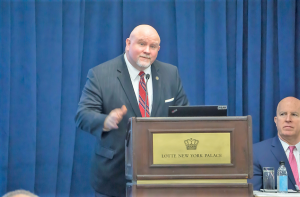FBI Veteran Bryan Paarmann Cites Need for Team Building in Crisis Management
A diverse, well-qualified team leads to more efficient crisis management according to Bryan Paarmann FBI (retired).
NANUET, NEW YORK, UNITED STATES, April 16, 2020 /EINPresswire.com/ -- Team building is a skill Bryan Paarmann FBI (retired) considers absolutely critical in any organization. Bryan Paarmann was fortunate enough and honored to have been able to develop this skill over time during a multi-decade career in the United States Army and with the Federal Bureau of Investigation.By 2017, his leadership skills led to Bryan Paarmann FBI (retired) being promoted to head the FBI New York City Office Counter-Terrorism Division and the New York Joint Terrorism Task Force — critical national security roles where losing time due to mismanagement and lack of team cohesion can mean lives lost or the lapse of critical response time.
In these roles, Bryan Paarmann FBI (retired) oversaw a highly active multi-organizational collaborative counter-terrorism team. The consistent discourse between organizations and a solid plan prior to deployment is needed to address various crises as they develop.
When tragedies, disasters, and other unforeseen events occur at the local level or on a nationwide or global scale, a cohesive approach where everyone chips in with expertise, authorities, and common effort helps mitigate problems. These goals can only be accomplished by a team with a singular vision.
Efficient disaster response teams are diverse and may include an assortment of federal and state workers, municipal government employees and private sector businesses, but they must deploy in unison. With a consistent approach, teams can more quickly address and identify new issues and forward new developments to appropriate partner agencies instead of acting unilaterally.
According to Bryan Paarmann FBI (retired), a good team can mean the difference between successful mitigation or extended recovery.
To develop a unified team, group leaders or crisis managers need to not only pick well-qualified individuals but fuse them into a mutually supportive and cohesive unit, Bryan Paarmann FBI (retired) said.
For example, a team focused on natural disasters or other specific incidents, may include a variety of cross-agency participants, such as health departments, educational, government and law enforcement partners. Bryan Paarmann FBI (retired) says innovative techniques are needed to develop cross-organizational unity and commonality of effort.
Getting a team on the same page involves both an educational component and the use of exercises to assess strengths, weaknesses, opportunities, and threats. This SWOT analysis can be applied to the team itself and specific situations the teams may encounter over time.
Bryan Paarmann FBI (retired) has retired after over 30 years in public service in a variety of different positions. Now Bryan Paarmann FBI (retired) is bringing his team building and strategic skills to private-sector security and safety services.
Caroline Hunter
Web Presence, LLC
+1 7862338220
email us here
Legal Disclaimer:
EIN Presswire provides this news content "as is" without warranty of any kind. We do not accept any responsibility or liability for the accuracy, content, images, videos, licenses, completeness, legality, or reliability of the information contained in this article. If you have any complaints or copyright issues related to this article, kindly contact the author above.

